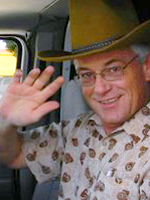Half-staff over Atlanta, the flags wave on
By Leon WordenJuly 31, 1996
| T |
As the story unfolded early Saturday, just ten days after the explosion of TWA Flight 800, it became clear that the incident in downtown Atlanta which killed two and injured 111 was simply the cowardly act of a pathetic nutcase.
There may be no such thing as absolute safety, but neither is there any real chance of seeing another Munich in Atlanta.
"If you talk to anybody associated with the Olympics," President Clinton told reporters hours after the Centennial Games' 80th bomb scare became reality, "they will tell you this is the best and most extensive security effort ever undertaken at an Olympics." It is also the largest peacetime security force in U.S. history, involving 30,000 people from 57 local, state and federal agencies.
It is an appropriate contingent for the largest peacetime event in history, twice as big as any other Games, approximately the size of Los Angeles (1984) and Barcelona (1992) combined.
After the bombing, all eyes were on the products and services of the Florida-based Sensormatic Electronics Corporation, the first-ever official electronic security sponsor of these first-ever high-tech Olympic Games. Sensormatic's goal of providing "an umbrella of security from the time everyone arrives in Atlanta until they leave" may have been overly ambitious, but the International Olympic Committee had enough confidence in the company's systems and in the overall security measures to continue the Games without delay.
The market leader in anti-shoplifting and video surveillance equipment, Sensormatic created a host of security systems for AT&T's Global Olympic Village and for the 40-plus sporting venues in and around Atlanta.
One of the most intriguing systems is Sensormatic's much-talked-about Hand Geometry Reader, a biometric palm device used in conjunction with an advanced photo ID system developed by Eastman Kodak.
The Hand Geometry Reader is straight out of a science fiction movie. Athletes and trainers record a three-dimensional topographical map of their hand when they arrive in Atlanta. The map is digitized and stored inside a chip in their accreditation badge. Each time they enter a high-security area, the athletes stick their hand inside the Reader, which compares the print to information that an antenna picks up from the chip. Only a perfect match allows entry.
While the device keeps unauthorized people out of high-risk areas, magnetometers (metal detectors) are used to keep contraband items out of the stands. No such high-tech screening equipment was used last week at Centennial Olympic Park, which was intended to be an open, unrestricted area where people could come and have fun without needing tickets or authorization.
Organized and integrated by IBM, Sensormatic and several other high-tech companies are bringing the Olympic Games into the 21st Century, both on the athletic field and off.
For the past two weeks, netizens of the earth have been pointing their browsers — their Internet surfboards — at www.atlanta.olympic.org, where a system developed by IBM, Swatch, BellSouth and Scientific-Atlanta feeds up-to-the-minute results from 271 separate events to the largest World Wide Website ever created.
This year's computer audience won't outnumber the 99 million Americans who tuned in to NBC last Tuesday to see the U.S. take home the gold in women's team gymnastics — the largest Olympic television audience since Nadia Comaneci scored her seven perfect 10s at Montreal in 1976. But the official Olympic Website is equipped to handle 10 million "hits" a day.
Big Blue is already making big plans for Nagano, Japan in 1998 and Sydney, Australia in 2000. An Olympic participant for 36 years, IBM has an option to be the Games' worldwide information technology sponsor through the year 2004.
In four years, when we're sitting at home in front of our combination television-computer screens and watching just those portions of the Olympics we want to see, when we want to see them, even the extraordinary security measures of the 1996 Games will seem primitive.
As is so often the case when something doesn't go quite as we hoped or planned, we will learn from this experience. We may never be completely ready for the unexpected, but next time, we will do it better.
I have attended soccer games in Munich's beautiful Olympic Stadium and have visited the monument to the fallen Israeli athletes there.
We remember the terror at Munich, as well we should. But we also remember Munich for giving us Mark Spitz and Olga Korbut. It seems to be an inescapable part of the Olympic story that out of tragedy invariably comes triumph.
The Olympic flame burns high above the flags that fly at half-staff over Atlanta today, a defiant reminder that nothing can dampen the Olympic spirit. We will battle back from this adversity. In time, we will remember Atlanta not for the antics of a lunatic, but for the glorious achievements of Kerri Strug and Donovan Bailey and the greatest athletes of the world.
©1996 LEON WORDEN — ALL RIGHTS RESERVED

